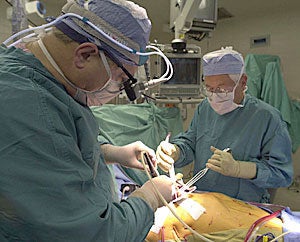ECU surgeon to perform heart valve surgery live online
Computer users from North Carolina’s Outer Banks to the Outback of Australia will be able to see a mitral valve surgical repair using robotic technology live on the Internet Jan. 18.
East Carolina University cardiothoracic surgeon W. Randolph Chitwood Jr. and his surgical team will perform a mitral valve repair using the da Vinci Surgical System. Each year, more than 50,000 procedures are performed on the mitral valve, which regulates the blood flow from the left atrium, or holding chamber, to the left ventricle, the heart’s main pumping chamber.

Dr. Randolph Chitwood, left, and physician assistant Larry King prepare a patient for mitral valve surgery with the da Vinci Surgical System. Photo by Cliff Hollis
Chitwood and his surgical team performed the first total heart valve surgery using robotic technology in North America in May 2000. To date, he has performed more than 175 mitral valve repairs using the da Vinci Surgical System.
Chitwood is professor of surgery, chief of cardiothoracic and vascular surgery, and senior associate vice chancellor for health sciences at the Brody School of Medicine at East Carolina University. The operation will be performed at Pitt County Memorial Hospital, the affiliated teaching hospital for ECU’s medical school.
The Eastern Carolina Cardiovascular Institute, which combines the clinical component of PCMH and the research effort from the Brody School of Medicine, is working with slp3D, an Internet broadcasting company that creates live and on-demand video for the health care industry, to make the live Web cast available. The Internet broadcast is scheduled to begin at 5 p.m. A link from the University Health Systems home page will take viewers to the live Web cast. This link also takes Internet users to the Webcast: http://www.or-live.com/PittCounty/1278/.
Chitwood will be assisted during the surgery by Dr. Richard Cook, a cardiothoracic surgery fellow at ECU. ECU cardiothoracic surgeon Wiley Nifong will host the live event.
Nifong said the primary audience will be fellow cardiac surgeons who want to see Chitwood’s surgical techniques; however, the public will be able to view the surgery for free as well. “”We see this as educational and informational. We’’ve been involved in the education of surgical teams for several years, and it’s an important part of the team’s success. This type of Web cast brings the procedure right to the surgeons so they don’’t have to travel to Greenville to see it,” he said.
““Additionally, we think that members of the general public might have interest in seeing this because either they have heart problems or a member of their family does. We hope that they will be able to see the benefits for the patient in this minimally invasive surgical approach,”” said Nifong, who is the director of the Robotic Training Center at ECU.
Chitwood noted that some surgeons viewed robotic surgery warily a few years ago, but research data has shown it is a viable option for many patients. “During these first 175 operations, we have learned that cardiac surgery can be done safely using robotic techniques with the same results as a full sternotomy (full chest incision). Visualization and dexterity are much better,” he said.
Chitwood pointed out that the majority of patients have excellent post-surgery recuperation results after minimally invasive, robotically assisted mitral valve surgery. The average length of stay in the hospital is less than four days compared with eight days for conventional open-heart procedures. Most patients are back to work in 10 to 14 days.